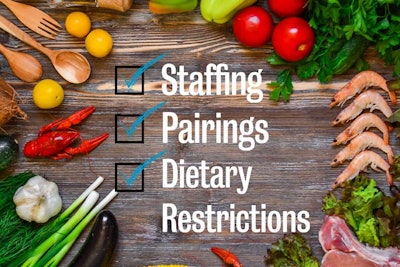
A pre-event food tasting is more than just an opportunity to sample the cuisine that your guests will enjoy. It’s a chance to create an open dialogue with your caterer, plan for last-minute fire drills, and confirm even the smallest details. Here are eight questions to help you get the most out of a food tasting.
What is your specialty? What do you do better than other caterers?
Being open to new ideas and capitalizing on what your caterer does best can help ensure that an event runs as smoothly as possible. “It’s important to tap into what caterers are good at and not try to reinvent the wheel, especially if the event has time restrictions,” explains Shai Tertner, C.E.O. and founder of Shiraz Creative in Miami.
Plus, letting a chef execute a signature dish can elevate a menu from great to exceptional. “I always appreciate it when a client asks what we’d like to make,” says Sigrid Helgason, director of sales at Farm To Market Catering in Dallas. “It gives us a chance to showcase our creativity and our chefs’ talent.”
How do you accommodate dietary restrictions? Is there an extra cost for these options?
In today’s culinary climate, even small events are likely to include guests with everything from peanut allergies to gluten sensitivities. “I recommend asking what the caterer can do to create a great experience that takes into account everyone’s dietary needs,” says Julie Lindenman, owner of New York-based Julie Lindenman Events.
Offering options ensures that everyone is properly cared for and able to fully enjoy the cuisine. Jenn Day, director of catering at Charlie Palmer Group, suggests getting as specific as asking what types of milk will be available to guests. Be sure to confirm whether providing vegan, gluten-free, or other alternatives will come at an extra cost or if those dishes are included as part of the standard catering package.
How will this dish scale up from a few plates at a tasting to hundreds at an event?
Executing a handful of plates at a tasting differs greatly from serving an entire ballroom. Ask the caterer how each dish will be affected when produced on a mass scale.
Tertner recommends discussing how the venue will come into play. “Ask where the kitchen is located, how long it will take for a waiter to get from the kitchen to the table, and how that distance will affect the temperature of the plate they’re serving,” he says. Off-premise events in particular come with their own challenges, as the venue might not be equipped with a professional kitchen. “I want to know that the caterer is mindful of these factors and is setting us up for success,” he says.
Is what I am tasting and seeing today exactly what will be served at the event?
To limit the chances of unwelcome last-minute surprises, be sure that both you and the caterer are clear on how what is being showcased at a tasting will be replicated for the actual event.
“Ask how the portion size will compare to what you’re seeing at a tasting and exactly how the finished plate will look,” suggests Day, who also recommends confirming that fresh ingredients won’t be substituted later. “The kitchen should be putting its best foot forward at a tasting, so it’s best to confirm that what you’re seeing is exactly what your guests will get.”
If a dish includes seasonal or hard-to-find ingredients, confirm that there is an alternate plan in case they are not available on the day of the event.
How can we customize the menu to best represent and complement my specific event?
More than just a vendor, a creative and collaborative caterer can be a crucial partner in making an event unique and impactful, using food as a way to enhance the guest experience.
“I love asking about customization and personalizing things,” says Lindenman. “I have a lot of clients interested in customizing a menu in ways that the caterer didn’t show initially.” If you’re planning a corporate event, for example, ask if the caterer can include the company logo on a cookie or if the brand’s color scheme can be reflected in a cocktail.
For a themed affair, see if the dishes or presentation can be tweaked to reflect and complement the decor. “If planners don’t ask those questions, our hands are tied when it comes to tailoring dishes to the needs of the party,” explains Brad Widish, senior account executive at Presidential Gourmet Catering in Toronto. “Give your caterer as much information as possible so that we have a complete understanding of the event.”
Can you create dishes to pair with a wine or liquor?
If your event has an alcohol sponsor, share that information with the caterer. Ask for the bartender to create a specialty cocktail using that specific brand of liquor, or for a wine-sponsored event, request that each course be paired with a specific bottle. “Caterers often have a knowledgeable staff, and even an in-house sommelier, that can help choose dishes that pair well with the event’s designated vintages,” says Lindenman.
If the event doesn’t have an alcohol sponsor, ask the caterer for recommendations for wine and liquor that are the best fit for your audience, food menu, and budget.
What serveware options do you offer? For a buffet, what will each station look like?
Food and drink presentation, from tabletop items to linens to serveware, should match the feel of the event.
“Nowadays there are so many party supply rental companies that caterers use because keeping inventory in stock and up to health codes is difficult,” says Tertner. Experienced caterers often have relationships with rental companies and thus have access to several options for everything from napkins to stemware. Think about details like the colors of the tablecloths on buffet stations, and consider what decorative elements can be included on serving dishes and stations to make them blend with the event’s overall look and theme.
What will the staff-to-guest ratio be?
Caterers also handle the details of service. Staffing plans should consider the layout of the venue, as expansive spaces require more staff. “Everyone is watching their dollars, but compromising on the number of servers can have a big impact on the event,” Helgason says. “You don’t want guests to be cranky or ‘hangry’ because there isn’t enough service staff.”
For a 100-guest cocktail party with a full bar, Tertner recommends staffing of two bartenders, four waiters, one or two busboys, and one captain. At more than 150 guests, he suggests adding a sanitation caption. For a 100-person seated dinner, Tertner recommends 15 to 20 waiters plus two to five busboys, two bartenders, one captain, and one sanitation captain. At 150 guests, he would add an assistant sanitation captain.
This story appeared in the Spring 2018 digital edition of BizBash.



















